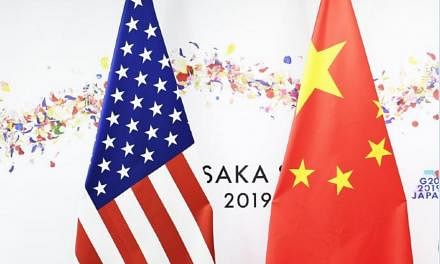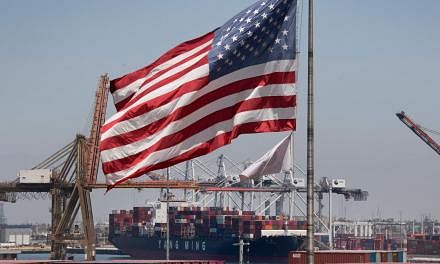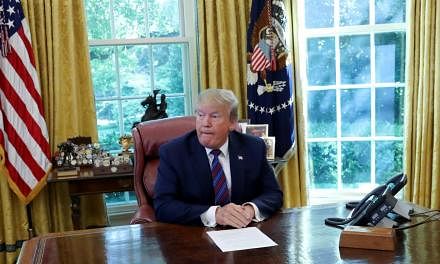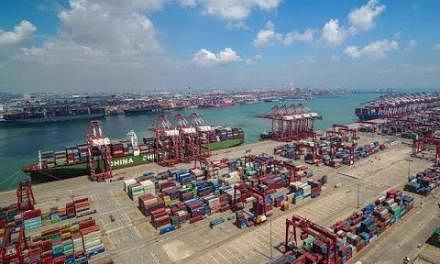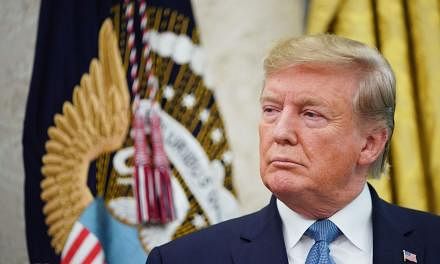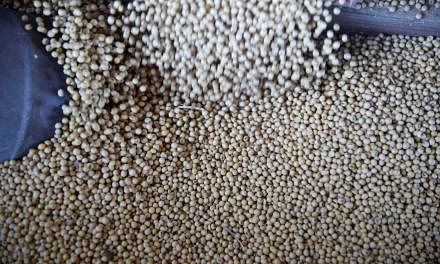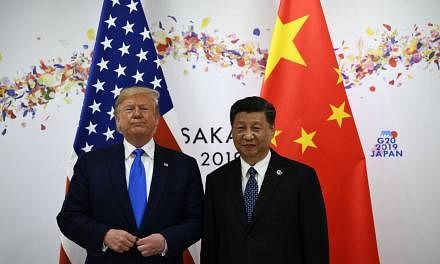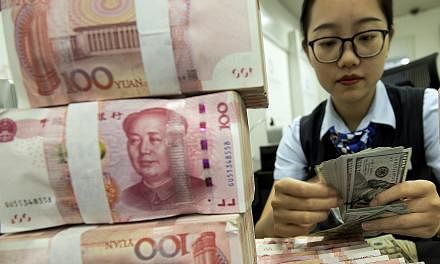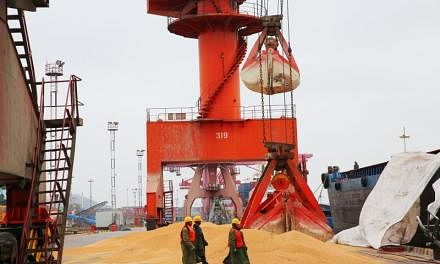WASHINGTON/BEIJING (REUTERS, AFP) - The world's two largest economies hurtled towards the start of a trade war with the launch of the first round of US tariffs on US$34 billion of Chinese goods on Friday (July 6), as US President Donald Trump said he may ultimately impose tariffs on more than a half-trillion dollars' worth of Chinese goods.
The United States began collecting the import duties at 12:01am (12:01pm Singapore time) on Friday (July 6). Beijing was expected to immediately retaliate dollar-for-dollar with its own counter-tariffs after Trump imposed 25 per cent duties on 818 categories of products including Chinese machinery, electronics and high-tech equipment including autos, computer hard drives and LEDs.
Companies like Husco International, a Wisconsin-based manufacturing company that makes parts for companies like Ford, General Motors, Caterpillar and John Deere, now face a 25 per cent increase on a variety of parts imported from China.
Austin Ramirez, Husco International's chief executive, said that increase would immediately put him and other US manufacturers at a disadvantage to competitors abroad.
"One of the big scary unknowns is we don't know how China will react," Ramirez said. "There are lots of things they could do to make life difficult for US businesses operating in China that would be detrimental to us."
Moments after the US tariffs took effect, China accused the US of unleashing "the largest trade war in economic history" and said it was "forced to take necessary countermeasures".
"China promised not to fire the first shot, but in order to defend the core interests of the country and the interests of the people, we are forced to take the necessary countermeasures," China's commerce ministry said in a statement.
Duties on US$500 billion of Chinese goods?
It remained to be seen whether the American president would carry out recent threats to respond to any Chinese retaliation with maximum pressure - raising US duties on Chinese goods in increments of US$200 billion until virtually all the goods America buys from its largest trading partner are subject to duties.
But, aboard the presidential jet on Thursday en route to Montana, Trump erased any hope of an about-face. He warned that subsequent rounds could see tariffs on more than US$500 billion worth of goods - roughly the amount that the United States imported from China last year.
"You have another 16 (billion US dollars) in two weeks, and then, as you know, we have US$200 billion in abeyance and then after the US$200 billion, we have US$300 billion in abeyance. Ok? So we have 50 plus 200 plus almost 300," Trump told reporters aboard Air Force One.
Trump's comments appeared to increase the stakes for potential retaliation by China. Previously, Trump had threatened up to US$400 billion in additional tariffs should China follow through on its plans to retaliate against the initial US tariffs on Chinese goods including autos, computer disk drives, pump and valve parts and light-emitting diodes.
The arrival of the long-threatened tariffs marked the failure of months of dialogue between the world's two largest economies and came amid hand-wringing from industry leaders who fear shrinking markets, higher prices and slower growth.
Tit-for-tat battle
The tariffs' arrival also made real a campaign-trail pledge for Trump, who has fulminated for years against what he describes as Beijing's underhanded economic treatment of the United States.
US officials accuse China of building that country's emerging industrial dominance by stealing the "crown jewels" of American technological know-how through cyber-theft, forced transfers of intellectual property, state-sponsored corporate acquisitions and other alleged practices.
And they say the current US economic strength, as well as America's soaring trade deficit in goods, means the world's largest economy can outlast its rivals in the current tit-for-tat battle, presenting Washington with a rare window of opportunity to settle old scores.
The US trade deficit in goods with China ballooned to a record US$375.2 billion last year, further stoking Trump's ire.
There was no evidence of any last-minute negotiations between US and Chinese officials, business sources in Washington and Beijing said. Requests for comment went unanswered at the US Treasury, USTR and the US Commerce Department.
China accused the United States on Thursday of "opening fire" on the world with tariffs set to take effect on Friday, warning that it will respond the moment that duties on US$34 billion in Chinese goods kick in.
The dispute has roiled financial markets including stocks, currencies and the global trade of commodities from soybeans to coal in recent weeks.
But US stocks edged higher on Thursday, lifted by technology shares, amid hopes that American trade tensions with Europe may ease after German Chancellor Angela Merkel said she would back a reduction of European car tariffs if Washington abandons its threatened higher car levies.
China has said it will not "fire the first shot" in a trade war with the United States, but its customs agency made clear on Thursday that Chinese tariffs on American goods would take effect immediately after US duties on Chinese goods are put in place.
Chinese Commerce Ministry spokesman Gao Feng said that the proposed US tariffs would hit many American and foreign companies operating in China and disrupt their supplies of components and assembly work.
"US measures are essentially attacking global supply and value chains. To put it simply, the US is opening fire on the entire world, including itself," Gao said.
Cars, disk drives and pump parts
US Customs and Border Protection officials are due to collect 25 per cent duties on a range of products including motor vehicles, computer disk drives, parts of pumps, valves and printers and many other industrial components.
The list avoids direct tariffs on consumer goods such as cellphones and footwear. But some products, including thermostats, are lumped into intermediate and capital goods categories.
China has threatened to respond with tariffs on hundreds of US goods, including top exports such as soybeans, sorghum and cotton, threatening US farmers in states that backed Trump in the 2016 US election, such as Texas and Iowa.
Chinese buying of soybeans has already ground nearly to a halt ahead of the duties.
In the latest sign that the risk of penalties is hitting trade, a vessel carrying US coal heading for China switched its destination to Singapore.
Asked whether US companies would be targeted with"qualitative measures" in China in a trade war, Gao said the government would protect the legal rights of all foreign companies in the country.
Gao said China's foreign trade was expected to continue on a stable path in the second half of the year, though investors fear a full-blown Sino-American trade war would deal a blow to Chinese exports and its economy.
Foreign companies accounted for US$20 billion, or 59 per cent, of the US$34 billion of exports from China that would be subject to new US tariffs, with US firms accounting for a significant part of that 59 percent, Gao said.
Ford maintains china pricing
US carmaker Ford Motor Co said on Thursday it has no plans to hike retail prices of its imported Ford and Lincoln models in China, despite the steep additional tariffs on imported US vehicles set to come into play on Friday.
Ford said it would "continue to monitor the situation as it evolves".
Adding to the tensions, a Chinese court this week temporarily barred Micron Technology Inc from selling its main semiconductor products in the world's biggest memory chip market, citing violation of patents held by Taiwan's United Microelectronics Corp (UMC).
Beijing has made the semiconductor sector a key priority under its "Made in China 2025" strategy, which has intensified after a US ban on sales to Chinese phone maker ZTE Corp underscored China's lack of domestic chips.

